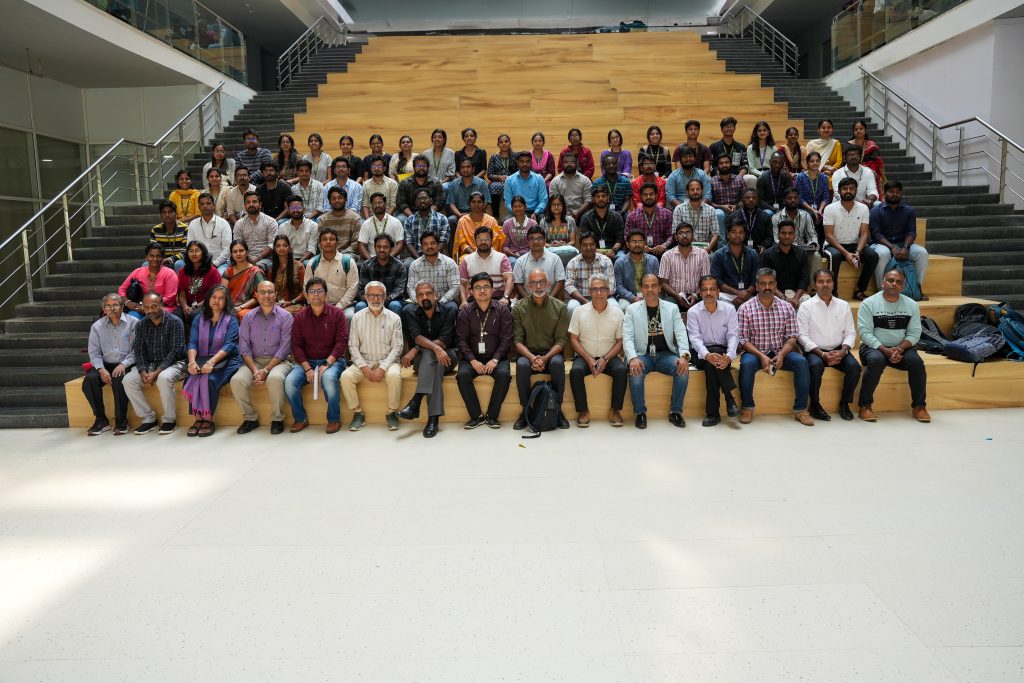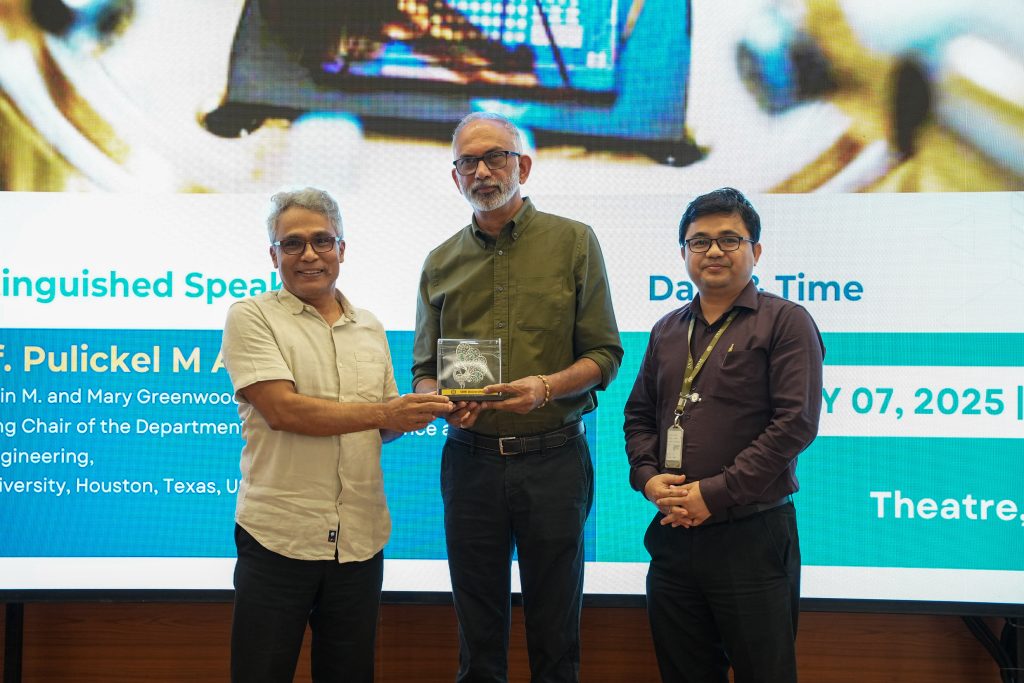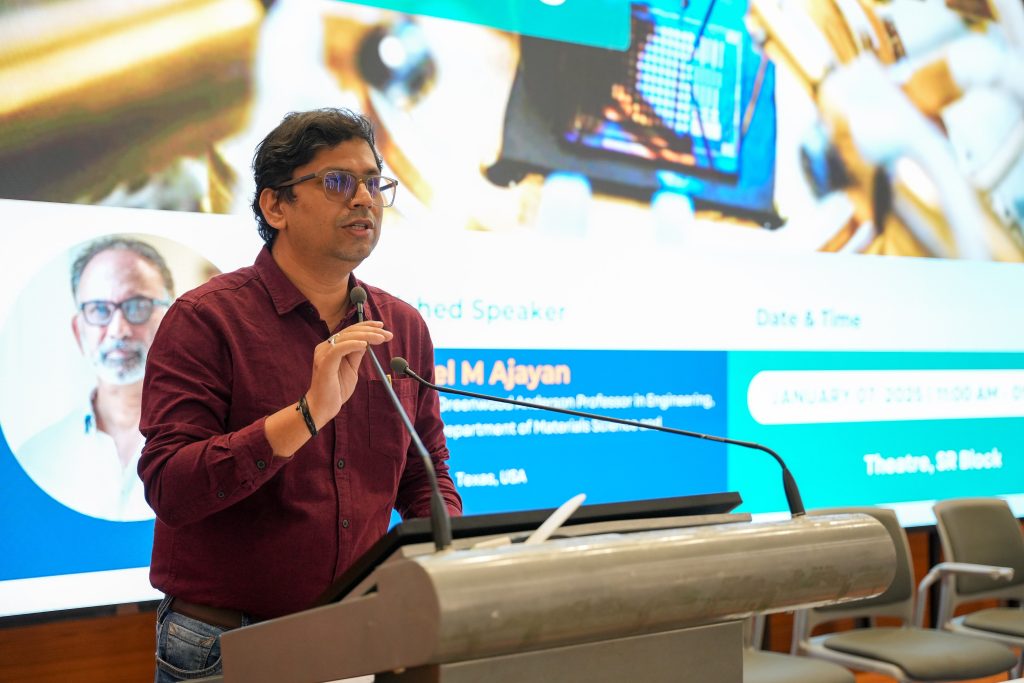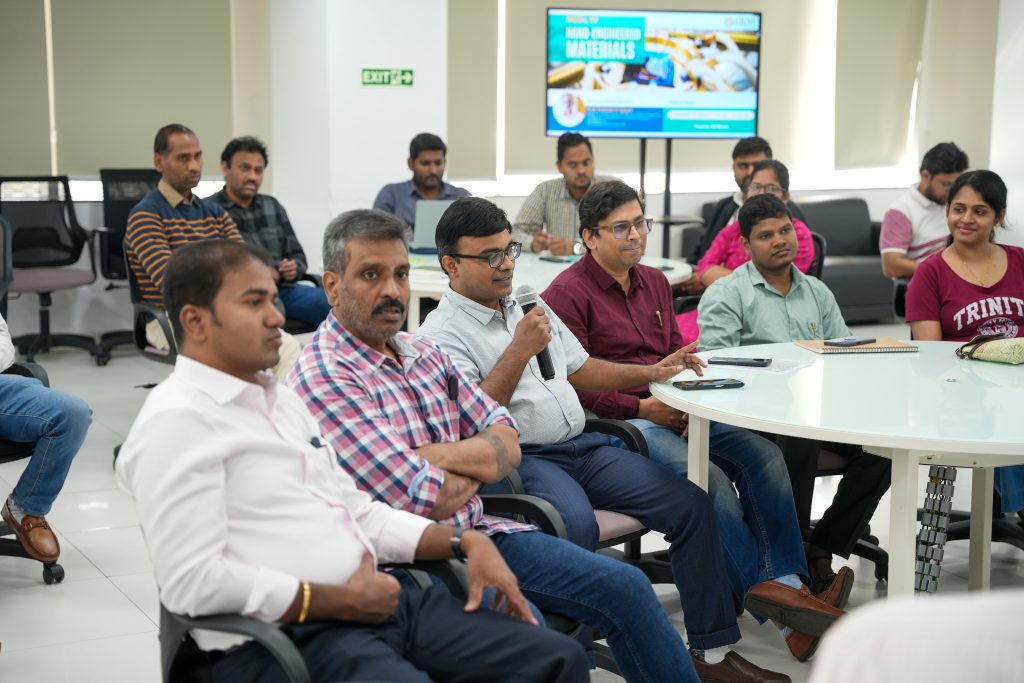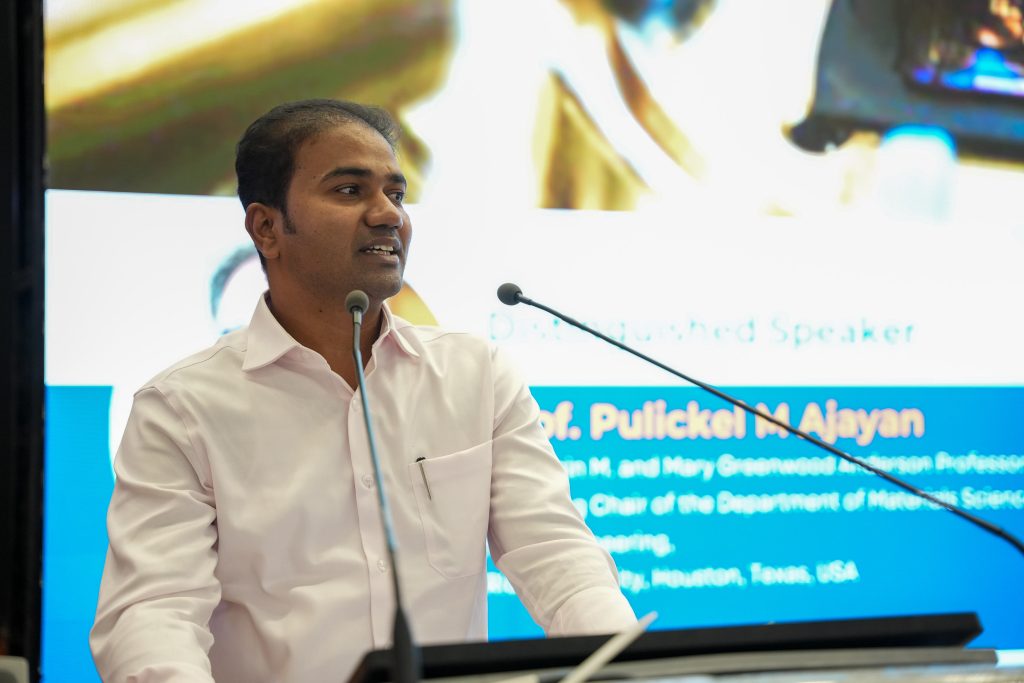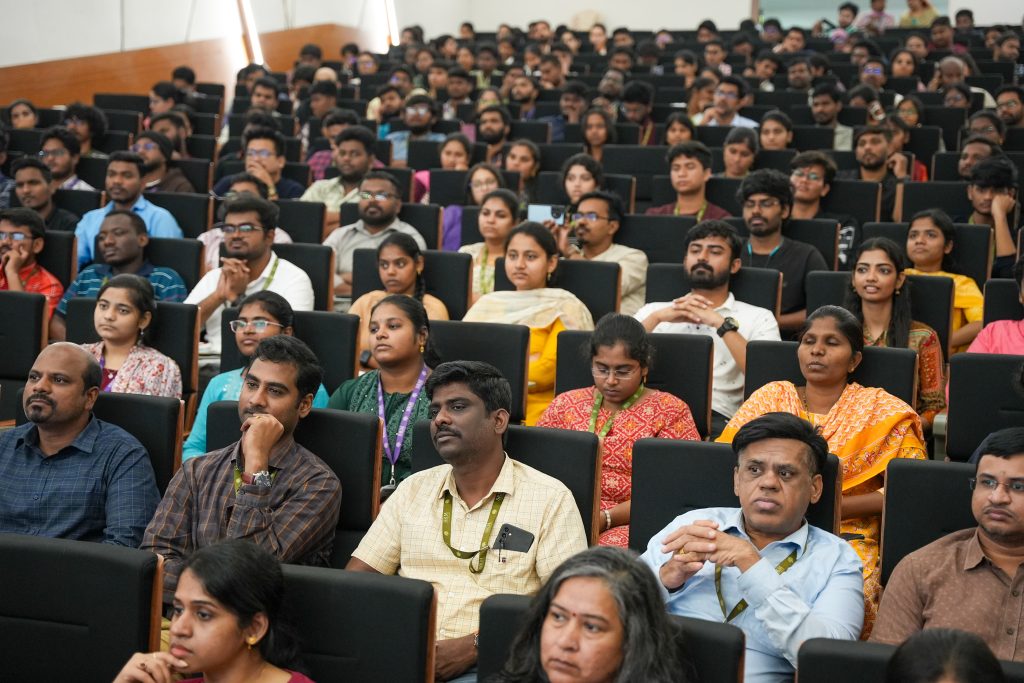Research News
- Revolutionising Cardiac Health Monitoring with Cutting-edge Innovation January 28, 2025

The research team consisting of Dr Manjula R, Assistant Professor from the Department of Computer Science and Engineering and her students, Mr Adi Vishnu Avula, Mr Abdul Jawad Khan, Mr Chiranjeevi Thota and Ms Kavyanjali Munipalle has published their patent titled “System For Determining And Predicting Scattering Coefficients Of Myocardium Tissue In Near-Infrared-Band For In-Vivo Communications” in the Indian Patent Office with the Application no: 202441090535.
Their research harnesses the power of machine learning and near-infrared (NIR) technology to analyse myocardium tissue with unmatched precision. By predicting scattering coefficients using advanced models like Gradient Boosting and Artificial Neural Networks (ANN), this breakthrough enables non-invasive diagnostics, early detection of heart conditions, and enhanced medical imaging. From 6G-enabled smart hospitals to regenerative medicine, this technology is set to transform healthcare.
With this groundbreaking invention, Dr Manjula and her research team pave the way for the future of connected, intelligent cardiac care!
Continue reading → - Dr Sushmita on Media, Marketing, and Management in Sports January 28, 2025
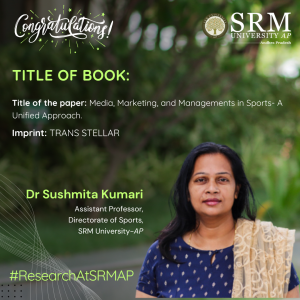 Dr Sushmita Kumari, Assistant Director of Sports, has authored a book titled “Media, Marketing, and Management in Sports: A Unified Approach.” Her publication presents a thorough examination of the pivotal roles that media relations, marketing strategies, and public relations play within the sports industry. Aimed at both students and professionals, the book delivers valuable perspectives on fan engagement, sponsorship dynamics, and effective crisis management. Through the use of real-world examples, Dr Sushmita highlights the transformative influence of digital media and the necessity for global adaptability in sports communication, making it an indispensable resource for anyone aspiring to succeed in the field of Sports.
Dr Sushmita Kumari, Assistant Director of Sports, has authored a book titled “Media, Marketing, and Management in Sports: A Unified Approach.” Her publication presents a thorough examination of the pivotal roles that media relations, marketing strategies, and public relations play within the sports industry. Aimed at both students and professionals, the book delivers valuable perspectives on fan engagement, sponsorship dynamics, and effective crisis management. Through the use of real-world examples, Dr Sushmita highlights the transformative influence of digital media and the necessity for global adaptability in sports communication, making it an indispensable resource for anyone aspiring to succeed in the field of Sports.Abstract:
The book, provides a comprehensive exploration of sports communication and management. It highlights the significance of media relations, marketing strategies, and public relations in shaping the success and image of sports entities. By integrating real-world examples, it delves into the interplay of traditional and digital platforms, showcasing their role in fan engagement, sponsorships, and crisis management. The content equips readers with the knowledge and skills necessary to navigate the evolving landscape of sports media and branding.
Target Audience:
The book is designed for students and professionals in sports management, communication, and media industries. It caters to academics, sports enthusiasts, PR practitioners, and industry leaders who seek to enhance their expertise in sports branding, marketing, and public relations.
Collaboration Details:
Acknowledgments highlight the contributions of mentors, colleagues, students, and industry experts, emphasizing the book’s foundation in academic and practical insights. It also includes case studies and experiences from media professionals, enhancing its relevance and applicability.
Social or Practical Implications:
- Digital Transformation: The book addresses the transformative power of social and digital media in fan interaction and brand promotion.
- Crisis Management: It provides strategies for managing crises in sports, ensuring sustained reputation and stakeholder trust.
- Global Engagement: It emphasizes the importance of adapting to globalization and cultural sensitivities in sports communication.
- Sponsorship Dynamics: Insights into sponsorship management underline its role in generating revenue and aligning brand values.
- A Critical Review in Understanding Equity and Social Justice in Mathematics Education January 28, 2025

Dr Jayasree Subramanian, Associate Professor from the Department of Mathematics, has recently published a book chapter titled “Strengthening Equity and Social Justice Research in Mathematics Education Through Critical Interrogations of White Supremacy and Settler Colonialism” in the Fourth International Handbook of Mathematics Education by Springer Publications.
Abstract
In this chapter, we contextualise a suggested approach to strengthening equity and social justice research in mathematics education by inserting the mathematics education enterprise into two world events of 2020: the global COVID-19 pandemic and the global resurgence of the Black Lives Matter movement. Our intent in doing so is to underscore how white colonialism is forever present everywhere in structures and institutions around the globe, including those of the mathematics education enterprise. The logic of both white supremacy and settler colonialism are described next and then combined into a compounding scheme of colonising white supremacist logic. To illustrate that colonizing white supremacist logic is not a manifestation of only the West, a discussion of the conflicts and contradictions of white supremacy and Brahminical supremacy in the mathematics education enterprise of postcolonial India is offered. Brief summaries of the five chapters in the “Equity and Social Justice” section of this Handbook are then provided; we highlight how the chapter authors interrogated colonialising white supremacist logic within their respective chapters and point toward additional opportunities. In concluding the chapter, we feature recent USA-based mathematics education research to illustrate different possibilities when equity and social justice research is strengthened through critical interrogations of white supremacy and settler colonialism.

About the Book
The Fourth International Handbook discusses developments not recognised or dealt with entirely in the first three Springer Mathematics Education handbooks and tackles controversial issues in the field. After starting with a provocative introductory chapter which asks whether controversy is a healthy feature of international mathematics education, the four following sections cover: (a) mathematics education in Asia; (b) the roles of theory in research and practice; (c) equity and social justice; and (d) curriculum and change. These themes are taken up in 28 chapters by 60 authoritative authors from all continents. The four sections are structured based on past, present, and future aspects.
Like the first three mathematics education handbooks, this handbook provides a valuable resource for teachers, practitioners and researchers, education policymakers, mathematicians, and graduate and undergraduate students.
Co-authors of the Book Chapter
1. David W. Stinson, College of Education and Human Development, Georgia State University, Atlanta, GA, USA (Lead Coauthor)
2. Cathery Yeh, Center for Asian American Studies, University of Texas, Austin, TX, USA (Fellow coauthor)
Continue reading → - Establishing an Innovative Technology for Intelligent Management of Battery Systems January 28, 2025

Dr Satyavir Singh, Assistant Professor from the Department of Electrical and Electronics Engineering and his PhD scholar, Mr Tasadeek Hassan Dar, have published a groundbreaking research paper titled “Advanced integration of bidirectional long short-term memory neural networks and innovative extended Kalman filter for state of charge estimation of lithium-ion battery.” The research that revolves around establishing technology for intelligent management of battery systems and their sustainability for longer life has been published in the Q1 journal, Journal of Power Sources, having an impact factor of 8.1.
Further to their research, the team will continue to work on robust techniques to BMS in the future.
Abstract
The state of charge (SoC) of a battery is a crucial monitoring indicator for battery management systems and it helps to assess how much further an electric vehicle can travel. This work proposes a novel approach for predicting battery SoC by developing a closed-loop system that integrates a bidirectional long short-term memory neural network with an innovative algorithm- extended Kalman filter. A second-order equivalent circuit model is selected, and its parameters are computed using the variational and logistic map cuckoo search approach.

Further, an Extended Kalman filter is combined with an innovation algorithm to update process noise in real-time, and a bidirectional long short-term memory neural network takes the input from the Extended Kalman filter and gives the compensated error value for the final SoC estimation. 75% of dynamic stress test data from the Extended Kalman filter is used for training purposes, remaining data sets are used for testing purposes. The addressed algorithm is validated by evaluating its performance in comparison to individual algorithms and various combined approaches. Empirical analysis demonstrates that the proposed model achieves a root mean square error of 0.11% and mean absolute error of 0.1% positioning it as a valuable tool for battery management systems.
Continue reading → - A Blockchain-Based Peer Tutoring Platform January 28, 2025
 In a rapidly changing educational landscape, innovative solutions are key to enhancing learning experiences. Ms Naga Sravanti’s patent on A System for Implementing a Peer Tutoring Platform, introduces a blockchain-based peer tutoring platform designed to tackle challenges in traditional education.
In a rapidly changing educational landscape, innovative solutions are key to enhancing learning experiences. Ms Naga Sravanti’s patent on A System for Implementing a Peer Tutoring Platform, introduces a blockchain-based peer tutoring platform designed to tackle challenges in traditional education.As we explore the implementation and societal implications of this platform, its potential to democratise education and create valuable connections among learners worldwide becomes evident. Join us in examining this innovative approach and its promising future research directions.
Abstract
This research presents a blockchain-based peer tutoring platform designed to enhance the quality and accessibility of education. By utilising blockchain’s decentralized and transparent features, the system ensures secure transactions, reliable certification, and the equitable management of peer tutoring activities. The platform aims to foster trust among users by recording all interactions and achievements on an immutable ledger, addressing critical challenges like data manipulation, lack of accountability, and accessibility issues in traditional education systems.
Explanation in Layperson’s Terms
Imagine a platform where students can teach and learn from each other without worrying about unfair practices or lack of credibility. This system uses blockchain, a technology that keeps records safe and transparent so that everyone can trust it. For instance, when a student tutors someone else, the system records this in a way that no one can alter. Certificates issued for achievements are also tamper-proof, making them reliable for future use. It’s like having a digital notebook that no one can tear a page from or erase anything written in it. This platform creates a fair and secure space where students and educators can collaborate effectively.
Practical Implementation and Social Implications
The peer tutoring platform has immense potential to revolutionise education:
Equity in Education: Students from diverse backgrounds can access quality tutoring at affordable costs or through a mutual exchange of knowledge.
Trust and Credibility: Blockchain’s secure system ensures that all records of learning and certifications are genuine and cannot be tampered with.
Recognition of Effort: Tutors can build verified portfolios showcasing their expertise and contributions, which can be used for job opportunities or further education.
Global Collaboration: Learners and educators worldwide can connect, exchange knowledge, and grow together, breaking geographical barriers.
Collaborations
This research has benefited from partnerships with educational institutions, blockchain developers, and organizations promoting innovative learning methodologies. Collaborators include academic peers at SRM University-AP and technical support from blockchain technology firms specializing in educational applications.
Future Research Plans
Building on this work, the following directions will be explored:
- Gamified Learning: Introducing game-like features to make learning more engaging and interactive.
- AI-Driven Personalization: Integrating AI to recommend the best tutors and resources for individual learners based on their unique needs.
- Scalability: Expanding the platform to accommodate millions of users globally without compromising speed or security.
- Real-World Deployments: Partnering with schools, universities, and governments to implement the system on a larger scale, bringing tangible benefits to communities.

Continue reading → - International Mathematicians Assemble for the RAMRA Conference at SRM AP January 27, 2025
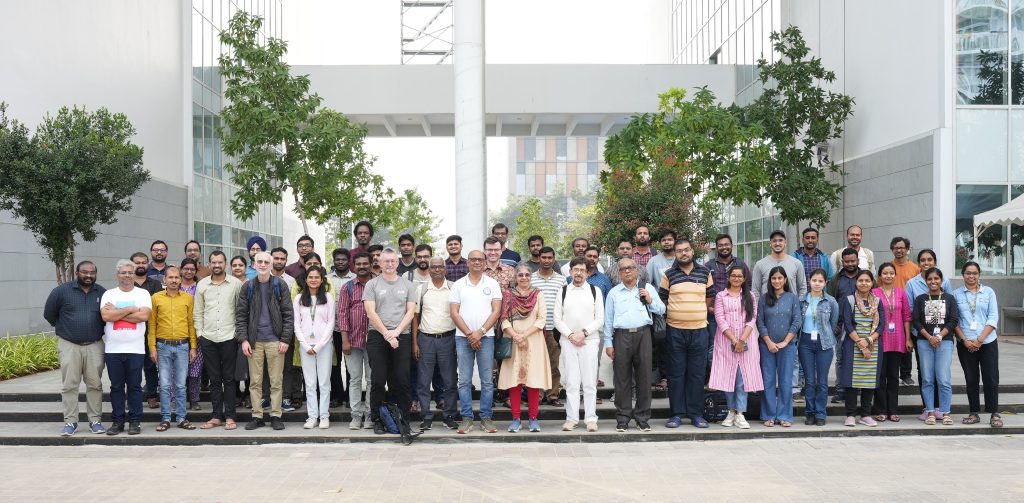
The Department of Mathematics organised the International Conference on Recent Advances in Mathematics and Related Areas 2025, from January 14 – 19, 2025, featuring the latest advancements in the field of pure and applied mathematics and theoretical computer science. The conference featured esteemed speakers like Fred Diamond (King’s College London), Ken Ribet (UC Berkeley), Jean-Marc Deshoulliers (University of Bordeaux), Gyula Katona (Alfred Renyi Institute Hungary), Olivier Ramare (CNRS France), Vita Kala (Charles University Prague) Mahan Maharaj, Anish Ghosh, Eknath Ghate (TIFR Mumbai), Apoorva Khare (IISC Bengaluru), U K Anandavardhanan (IIT Mumbai), Sukumar Adhikari (RKMVERI), B Ramakrishnan, Madhavan Mukund (CMI), Meena Mahajan (IMSc Chennai), Ken Ono (University of Virginia), and Anupam Saikia (IIT Guwahati).
The conference included sessions on topics and cutting-edge research on number theory, representation theory, Langlands program, geometry and topology, ergodic theory, lie algebra, diophantine approximation, modular forms, graph theory, combinatorial algebra, theoretical computer science, etc.
In his inaugural address, Dr Kalyan Banerjee, Assistant Professor and programme convenor from the Department of Mathematics, mentioned the importance of this conference in the research of mathematics and related areas. The Head of the Department, Prof. Kalyan Chakraborty talked about the history and relevance of this conference in the context of Indian and international mathematical communities.
On the last day of the conference, the Vice Chancellor of SRM AP, Prof. Manoj K Arora, SRM University-AP, hosted an interactive session with the distinguished speakers of the conference and other participants. In this interaction, the possibility of collaboration (both teaching and research) with different foreign universities was discussed.
The conference hosted 17 distinguished invited speakers from India and abroad and 8 young scholars. There were 40 participants from different research institutes in India, such as IISER, IMSc, CMI, and IITs. An upcoming conference proceeding will feature the articles of the invited speakers in association with Springer Proceedings. Additionally, the National Board of Higher Mathematics generously supported the conference.
Continue reading → - SRM AP Partners with Uniglobus Electrical and Electronics Pvt. Ltd. for EC-less LED Lighting Research January 24, 2025

In a significant stride towards advancing sustainable energy technologies, SRM University-AP has signed an Memorandum of Understanding (MoU) with Uniglobus Electrical and Electronics Pvt. Ltd. The collaboration aims to develop cutting-edge EC-less LED lighting systems through a joint research initiative. The partnership was formalised following an exploratory visit by Uniglobus representatives, Mr Gajanan Inamdar and Mr Saurabh Maheta, to SRM AP. During their visit, they engaged in extensive discussions with the university faculty, identifying EC-less LED drivers as a promising area for impactful research.
Dr Ramanjaneya Reddy Udumula, Assistant Professor from the Department of Electrical and Electronics Engineering, will lead this innovative project as the Principal Investigator. Highlighting the significance of the collaboration, he noted, “This research initiative will address critical challenges in energy-efficient lighting while fostering a bridge between academic insights and industrial expertise.”
Uniglobus has also invited Dr Udumula to visit its state-of-the-art facilities to gain an in-depth understanding of their advanced product line. This visit underscores the mutual commitment to fostering a symbiotic relationship between academia and industry, paving the way for groundbreaking technological advancements.
Key figures instrumental in making this collaboration a reality include Vice Chancellor Prof. Manoj K. Arora, Prof. Ranjit Thapa, Dean of Research; Prof. Vinod Kumar G S, Associate Dean of the Technology Transfer Cell; and Prof. C.V. Tomy, Dean of the School of Engineering and Applied Sciences (SEAS). Their collective efforts, alongside the support of Mr BS Praveen from Uniglobus, have laid the foundation for this transformative partnership.
The project focuses on addressing critical global challenges associated with energy sustainability and efficiency. With the rapid industrial growth and increasing global population driving energy demand, the limitations of conventional energy sources have become a pressing concern. Governments and industry leaders worldwide are calling for innovative solutions to promote energy-saving and sustainable technologies.

A Game-Changing Innovation
The research aims to develop an Electrolytic Capacitor (EC)-less, ripple-free LED driver system. Unlike conventional LED drivers, this system employs a DC-DC converter as a power factor correction (PFC) unit and a bi-directional buck-boost converter (BDC) to eliminate second harmonic ripples. This configuration simplifies control mechanisms while ensuring high power factor and reduced total harmonic distortion, delivering a steady DC current to the LED load.
Towards a Sustainable Future
This collaboration marks a significant milestone in addressing sustainability challenges through innovation. By merging the academic expertise of SRM University-AP with the industrial insights of Uniglobus Electrical and Electronics Pvt. Ltd., the partnership seeks to deliver impactful solutions for a greener, more sustainable future.
The MoU underscores SRM University-AP’s commitment to fostering innovation through strategic collaborations, positioning the institution at the forefront of research and technological development in energy efficiency. Both partners look forward to a fruitful and enduring collaboration that promises to benefit society at large.
Continue reading → - The Key to a Transformative Future – Systems Engineering Summit 2025 at SRM AP January 24, 2025

“The future is going to be a system of systems,” – Mr Dasari Ramakrishna, CEO & MD of Efftronics Systems Pvt. Ltd. at the Systems Engineering Summit 2025 hosted by SRM University-AP.
SRM University-AP kicked off the prestigious Systems Engineering Summit 2025 (SES 2025) on January 23, 2025, partnering with Efftronics Systems Pvt. Ltd., INCOSE India, IEEE Systems Council, Confederation of Indian Industry (CII) and the Information Technology Association of Andhra Pradesh (iTAAP). This two-day summit, to empower the next generation of system engineers, is designed as an outreach initiative to introduce students, faculty, and industry professionals to fundamental concepts, techniques, and exciting career thoughts in systems engineering.
Vice Chancellor, Prof. Manoj K Arora remarked, “Systems Engineering is a highly interdisciplinary field that overarches all branches of engineering and management disciplines. The SES 2025 is an informative platform for young engineers to understand how systems engineering drives innovation in today’s complex world.”
This summit brought together thought leaders and industry practitioners from different sectors, such as aerospace, automotive healthcare, defence, and industry manufacturers, for an array of keynote sessions and panel discussions on systems engineering as a key to navigating the transforming world. Mr Dasari Ramakrishna of Efftronics Systems Pvt Ltd opined that Systems Engineering provides exceptional aspirational directions and career thoughts. He said that in this rapidly evolving world, automation with a system of systems integration is the future, and it is time to introduce the concept into the curriculum of higher educational institutions.
An MoU was signed between SRM University-AP and Efftronics Systems Pvt. Ltd. to ensure active industry participation in academia, bridging the gap between the classroom and the workforce. SRM University-AP and the other participating universities, VIT-AP University, Vignan University, Siddhartha Academy of Higher Education, and Acharya Nagarjuna University, also signed an MoU with INCOSE India, exploring various opportunities to ensure the academic curriculum of the universities are made industry-ready.

Dr Yogananda Jeppu, Executive Committee Member – Academia, INCOSE India, Technical Fellow and Systems Architect – Boeing, stated, “The collaboration between industries and educational universities is the driving force of innovation. In a world of interconnectedness and complexity, systems engineering is the interdisciplinary field that will break the silos and bring innovation through its methodology.”
Notable dignitaries from industry, academia and the government including Smt. Lakshmi Mukkavilli, President, IT Association of Andhra Pradesh, MD – Patra India BPO Services; Dr S V Kota Reddy, Vice Chancellor, VIT-AP University; Prof. Paruchuri Venkateswara Rao, Vice Chancellor, Siddhartha Academy of Higher Education; Prof. K Gangadhara Rao, Vice Chancellor, Acharya Nagarjuna University; Cmde. Dr M S Raghunathan, Registrar, Vignan University; Dr Maheswar Dwivedy, Associate Dean – Academia-Industry Relations and Professional Internships, SRM AP also shared their insights on the significance of this prestigious summit.
The Systems Engineering Summit 2025 organised as a joint initiative by SRM AP and various organisations, proved to be not just a summit but a call for action. The summit inspired a meaningful dialogue to create a roadmap for technological advancements in systems engineering for a more equitable and more sustainable society.
Continue reading → - Patent on SQL Free Database Interaction January 9, 2025
This research, by Dr Ashu Abdul, Assistant Professor and research scholar Ms Surya Samantha Beri along with forth-year student, Mr Jakkampudi Venkatasubbaiah from the Department of Computer Science and Engineering explores a framework designed to help users retrieve and analyse data without requiring any Structured Query Language (SQL) knowledge. The patent titled, “System and Method for Generating Structured Queries from Natural Language Inputs , with application no: 202441096460 is particularly relevant as it enables individuals, like a car dealer seeking sales insights, to interact with their databases using everyday language. Such accessibility underscores the importance of this research in democratising data access for all users.
Abstract:
This project is centred around creating a framework that translates user queries into SQL statements and retrieves results without requiring any SQL knowledge from the user. By delving into the workings of various RDBMS systems, with a special focus on MySQL, I developed a solid understanding of database architecture and how databases are engineered for optimized performance. This knowledge was critical in designing a system that can seamlessly interact with any given database, analyse it, and provide relevant results in response to user input.
About the Framework:
This framework is intended to convert the user queries into SQL statements and attain the results from the database without intervention of SQL coding. Every time writing multiple SQL commands to apply filters, commands, and extracting data is time-consuming and requires having knowledge of SQL knowledge. This project is intended to analyze a database and answer the questions that are related to a particular database without writing SQL commands.
Explanation in Layperson’s Terms:
In-General we rely on programmers who are efficient in programming SQL for finding the insights from the database which are related to business or information. So, Laymen cannot access data without knowing SQL this project makes it possible. Assume, Mr. A a car dealer owns a showroom has a software dealing with his Business he wants to access his data and get insights for understanding the sales. Now he is not familiar with using SQL so he relies on someone for that or opens software and applies multiple filters to analyze his data. But What if he can use a chatbot and get solutions for all his questions from his database?
Mr.A can get conclusions from his data within no-time that thought represents this entire project.What are the use cases of this framework to a layman?
Laymen interaction with the database for understanding their data. Reducing the requirement to understand and search for the filters in the front-end. Faster data extraction from the database. Generating the results based on user queries in natural language without SQL coding. Elimination of time and efforts required for writing SQL Commands or applying filters. Understanding data gets easier for engineers as well as unknown data can be understood easily.
Practical Implementation:
This project has been successfully integrated into several existing real-time applications, enabling precise identification of data locations. By fine-tuning and enhancing our algorithms, we have achieved significant improvements in accuracy. In practical terms, users can effortlessly explore and comprehend their data.
Furthermore, extensive testing across databases of varying sizes has demonstrated the project’s ability to deliver significant and well-structured results.
Future Enhancements:
Incorporating Natural Language Processing (NLP) to process and respond to queries in users’ native languages, including speech-to-text capabilities.
Facilitating the generation of dynamic reports in various formats such as PDFs and Excel sheets.
Expanding compatibility to support additional database systems like Oracle, PostgreSQL, and NoSQL models.
Enabling data extraction and analysis from Excel sheets and CSV files.
Continue reading → - Renowned Nanoscientist Prof. Pulickel M Ajayan Delivered UDL#19 January 8, 2025
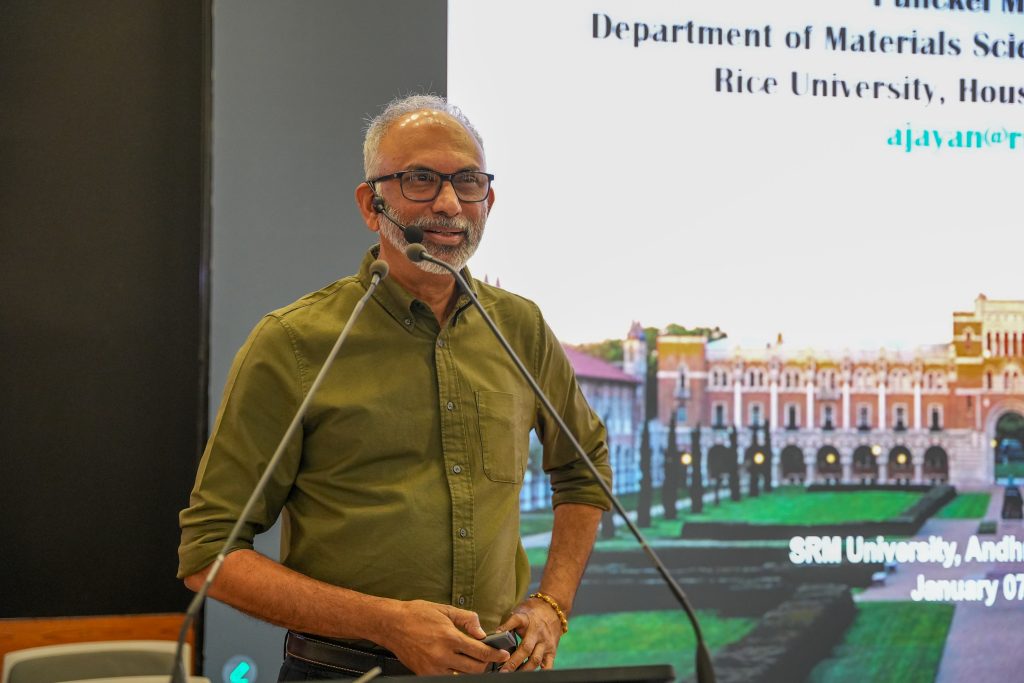
“Engineering very small things, structures less than 10nm, is challenging – and this is my biggest interest.” – Prof. Pulickel M Ajayan.
The university hosted its nineteenth edition of the University Distinguished Lecture, featuring a celebrated talk on “Nano-Engineered Materials” by eminent scientist Prof. Pulickel M Ajayan, Benjamin M. and Mary Greenwood Anderson Professor of Engineering and Founding Chair of the Department of Materials Science and Nanoengineering at Rice University, Texas, USA on January 07, 2025. A pioneer in nanotechnology with a noteworthy career extended to three decades, Prof. Ajayan’s session elucidated the recent developments in nanotechnology, particularly in relation to the challenges in designing and controllably synthesising functional nano-engineered materials.
Prof. Ajayan spoke extensively on the three major key points – Atomically Thin Layers (2D) Vertical and Lateral Heterostructures, Defects & Single Atoms and Printed 3D Nano-architectures & Nanocomposites. “Three decades ago, nanotechnology or nanomaterial science was just emerging. Today, it has become an enabling technology with fundamental developments in controlled manufacturing of nanomaterials,” remarked Prof. Ajayan in his lecture. He proceeded to elucidate the various phases of nanotechnology – the first phase, where scientists worked on the fundamental understanding of material synthesis, controlled fabrication, etc.; the second phase of integrating nanotechnology into potential devices; and the current phase of high-tier development through commercialisation.
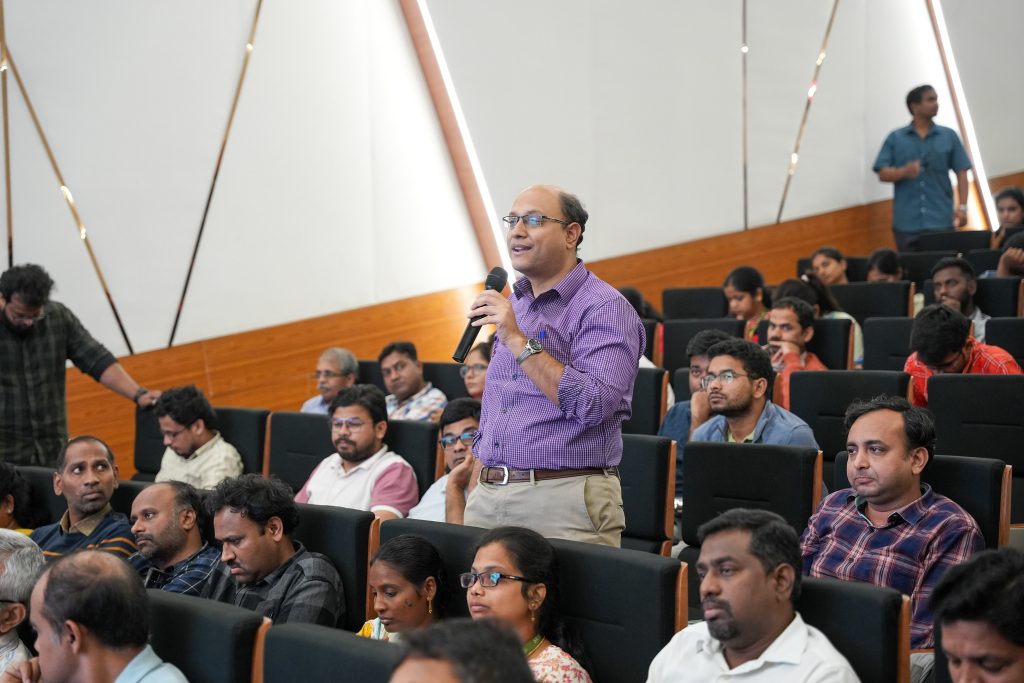
“A prominent figure in nanotechnology, Prof. Ajayan’s work in carbon nanotubes is exemplary in understanding the building of nano heterostructures. It is a privilege to have him share his wealth of knowledge on this remarkable occasion,” said Prof. CV Tomy, Dean – SEAS, in his welcome address. Prof. Ranjit Thapa, Dean – Research, also praised Prof. Ajayan for his contributions to nanoengineering and material science. Prof. Ajayan also had a brief interaction with the faculty regarding potential academic and research collaborations.
The 19th University’s distinguished lecture on nano-engineered materials ignited genuine curiosity about the field among the participating students. The profile of Prof. Pulickel M Ajayan and his astounding research portfolio motivated both faculty and students to explore nanoengineering and material sciences. The 19th UDL was graced by the presence of Registrar Dr R Premkumar, Deans of various schools, faculty from various streams and students of the varsity. The UDL series is a testament to the university’s passion for research and commitment to place SRM AP in the frontiers of academic and research excellence.
Continue reading →











